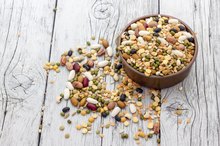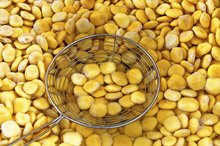Are Kidney Beans Bad for a Diabetic?
Kidney beans are part of the plant family Phaseolus vulgaris, otherwise known as common beans. Rich in protein, natural fiber and various vitamins and minerals, kidney beans are a healthful food to include in a diabetic's nutrition plan. In fact, the American Diabetes Association has designated kidney beans as a "super food," due to the fact that they provide you with several nutrients of particular importance when you are living with diabetes mellitus 2.
Slow Carbohydrates
Kidney beans contain a significant amount of carbohydrates in the form of starch, which breaks down into sugar in your digestive tract. You need not worry about kidney beans causing a sudden jump in your blood sugar level, however, because they contain slow carbohydrates. This means the carbohydrates break down and are absorbed slowly from your intestines, which dampens the effect on your blood sugar level. A cup of cooked kidney beans contains approximately 39 g of carbohydrates and 0.6 g of sugars.
- Kidney beans contain a significant amount of carbohydrates in the form of starch, which breaks down into sugar in your digestive tract.
- This means the carbohydrates break down and are absorbed slowly from your intestines, which dampens the effect on your blood sugar level.
Fiber
The Carbohydrates in Kidney Beans
Learn More
Kidney beans are an outstanding source of dietary fiber, with approximately 13 g in a cup of cooked beans. Fiber is an important nutrient for everyone, but it's particularly important for diabetics. Dietary fiber helps lower your blood cholesterol level by binding the fat in your intestines, leading to its excretion in your stool. Additionally, many long-term diabetics develop problems with intestinal slowing due to disease-related nerve damage, often leading to chronic constipation. Eating fiber-rich foods, such as kidney beans, helps keep your bowels moving regularly.
- Kidney beans are an outstanding source of dietary fiber, with approximately 13 g in a cup of cooked beans.
- Dietary fiber helps lower your blood cholesterol level by binding the fat in your intestines, leading to its excretion in your stool.
Lean Protein
Kidney beans are a nearly fat-free source of dietary protein, with approximately 15 g per 1-cup serving. Substituting kidney beans for animal-derived protein in some of your meals is a heart-healthy choice.
Potassium
Renal Diabetic Diet for Breakfast
Learn More
Your body uses the mineral potassium for many functions, including maintaining water balance. Inadequate dietary potassium increases your risk of high blood pressure, which is particularly dangerous if you have diabetes. High blood pressure is a contributing factor to heart and kidney disease -- two long-term complications of diabetes. Therefore, it's important to do everything possible to keep your blood pressure under control, including consuming sufficient dietary potassium. Kidney beans contain a substantial amount of potassium, offering 690 mg per cup of cooked beans.
- Your body uses the mineral potassium for many functions, including maintaining water balance.
- Inadequate dietary potassium increases your risk of high blood pressure, which is particularly dangerous if you have diabetes.
Magnesium
Magnesium is involved in the ability of your cells to respond to the blood sugar-lowering hormone insulin. Therefore, adequate intake of this mineral is fundamentally important if you have Type 2 diabetes. A cup of cooked kidney beans provides you with approximately 75 mg of magnesium. The recommended daily intake of magnesium is 320 mg for women and 420 mg for men. If you take a water pill for high blood pressure, you may require additional magnesium. Talk with your doctor if you have questions about your magnesium intake.
- Magnesium is involved in the ability of your cells to respond to the blood sugar-lowering hormone insulin.
- If you take a water pill for high blood pressure, you may require additional magnesium.
Related Articles
References
- Purdue University Center for New Crops & Plant Products: Phaseolus vulgaris L.; January 1998
- American Diabetes Association: Making Healthy Food Choices
- "Molecular Aspects of Medicine"; Role of Magnesium in Insulin Action, Diabetes and Cardio-metabolic Syndrome X; Mario Barbagallo, M.D., et al.; February–June 2003
- Red kidney beans, dry, cooked, fat not added in cooking. FoodData Central. U.S. Department of Agriculture. Published April 1, 2020.
- Lattimer JM, Haub MD. Effects of dietary fiber and its components on metabolic health. Nutrients. 2010;2(12):1266-89. doi:10.3390/nu2121266
- Havard Health Publishing. Glycemic index for 60+ foods. Updated January 6, 2020.
- Abeysekara S, Chilibeck PD, Vatanparast H, Zello GA. A pulse-based diet is effective for reducing total and LDL-cholesterol in older adults. Br J Nutr. 2012;108(S1):S103-S110. doi:10.1017/s0007114512000748
- Rebello CJ, Greenway FL, Finley JW. A review of the nutritional value of legumes and their effects on obesity and its related co-morbidities. Obes Rev. 2014;15(5):392-407. doi:10.1111/obr.12144
- Ha V, Sievenpiper JL, de Souza RJ et al. Effect of dietary pulse intake on established therapeutic lipid targets for cardiovascular risk reduction: A systematic review and meta-analysis of randomized controlled trials. CMAJ. 2014;186(8):E252-62.doi:10.1503/cmaj.131727
- Sievenpiper JL, Kendall CWC, Esfahani A, et al. Effect of non-oil-seed pulses on glycaemic control: a systematic review and meta-analysis of randomised controlled experimental trials in people with and without diabetes. Diabetologia. 2009;52(8):1479-95. doi:10.1007/s00125-009-1395-7
- Havenaar R. Intestinal health functions of colonic microbial metabolites: a review. Benef Microbes. 2011;2(2):103-14. doi:10.3920/bm2011.0003
- Kasera R, Singh BP, Lavasa S, Prasad KN, Sahoo RC, Singh AB. Kidney bean: a major sensitizer among legumes in asthma and rhinitis patients from India. PLoS ONE. 2011;6(11):e27193. doi:10.1371/journal.pone.0027193
- Palmer S. Nutritional anomaly—might antinutrients offer some benefits?. Today's Dietitian. 2011;12(7):54.
- Gupta RK, Gangoliya SS, Singh NK. Reduction of phytic acid and enhancement of bioavailable micronutrients in food grains. J Food Sci Technol. 2015;52(2):676-84. doi:10.1007/s13197-013-0978-y
Writer Bio
Dr. St. John is a medical writer and editor with more than 15 years experience in the field. She is a former medical officer for the Centers for Disease Control and Prevention.









